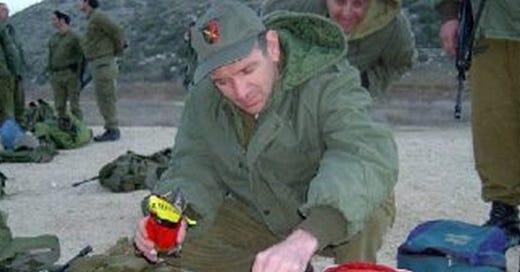“You had your coffee already?” My husband sounded disappointed as he came downstairs on Sunday morning, and rightfully so. I rarely drink my morning coffee without him. “I can have another one,” I said, “if you are making BOTZ(בוץ) .”
At that my 11-year-old looked up from his eggs and toast to ask in disbelief – “you are making coffee out of mud?” My children may look Israeli, but his question reminded me that they are not. If you really want a taste of Israel – mud is what we are all about.
Every culture has its coffee and ours is a small, dark, and bitter one. The joke is that our coffee is like our lives –oh, and it is cooked, not made. We cook coffee, like we cook our wars, both made of mud.
Proto-Semitic, the joint origin of Semitic languages, includes the word BOOTZ. It appears in Phoenician (and from there to Greek), Ugaritic, and biblical Hebrew, which uses it several times such as:
”וַיַּעַשׂ אֶת הַפָּרֹכֶת תְּכֵלֶת וְאַרְגָּמָן וְכַרְמִיל וּבוּץ וַיַּעַל עָלָיו כְּרוּבִים“ (דברי הימים ב׳ ג, פסוק יד)
“And he made the Parochet of blue wool, and purple, and crimson, and fine linen, and wrought keruvim thereon.” chronicles 2 chapter 3.
Bootz is rope made of natural fibre or the fibres themselves.
Is that related to mud? Perhaps – the word botz appears only once in the Hebrew Bible – in book of Jeramiah –
”הִסִּיתוּךָ וְיָכְלוּ לְךָ אַנְשֵׁי שְׁלֹמֶךָ, הָטְבְּעוּ בַבֹּץ רַגְלֶךָ, נָסֹגוּ אָחוֹר.“ (ירמיהו לח, פסוק כב)
“Behold, all the women that are left in the king of Judah's house shall be brought forth to the king of Babylon's princes, and those women shall say: Thy familiar friends have set thee on, and have prevailed over thee; thy feet are sunk in the mire, and they are turned away back.” Jeremiah 38, 22.
The legs of the king will sink into the mud (ba-botz), as the prophet promises him that the Babylonians will capture him, and he will die in this war.
Israeli soldiers – with both kinds of mud – cooking coffee on the way Lebanon.
Mud in modern Hebrew represents war; more specifically, mud represents Lebanon.
The Lebanese mud through which Israel trod during the 80s and again in the 2000s is ever present, always lurking round the corner. “Are we going to drown in the Lebanese mud again?” is a question in everyone minds. It is not just the metaphorical mud of political mess with no end in sight that Lebanon represents, but also the long, wet winter made even muddier when tanks and heavy armoured vehicles stir the mud into a marsh. The IDF was stuck in the physical mud, as the government was stuck in its political quagmire (the English origin of this concept). It was of little help that Lebanon is to the north of Israel, and the Bible warns us about evil coming from the north. Events like the nursery terror attack (and many others) just reinforced that sentiment, and thus Israelis fear the war up north both for its gruesome reality of modern day, and its mythical dystopian promises of the past.
Among the things that makes me feel out of place in England is the coffee. Western coffee is fine, but it is not home. Israelis pride themselves on having the ability to cook coffee everywhere – like in the picture above, using a small burner and pot. All tucked in the trunk of the car, ready for any scenario that might come.




